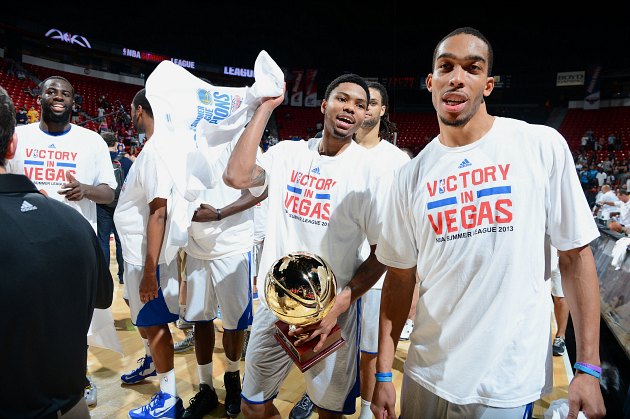
The NBA's annual Las Vegas Summer League came to a conclusion on Monday night with the Golden State Warriors defeating the Phoenix Suns 91-77. It was an entertaining game in the form we've come to expect from these late-July contests: a little loose, featuring only a handful of notable players, but mostly enjoyable simply because it had one of the highest levels of talent in the world of basketball.
Monday's finale was different, though, in that it was an honest-to-goodness championship game. The Warriors' victory, in which non-roster invitee Ian Clark hit 7-of-10 shots from beyond the arc for 33 points and Championship Game MVP honors, gave them a real trophy, "Victory in Vegas" Adidas-branded title shirts, and the satisfaction of knowing they'd accomplished a goal. (It also solidified the team's reputation as a Summer League dynasty whose dominance had been proven only unofficially in previous years.) It's unclear how meaningful the accomplishment is, but it still gives the Warriors another positive moment to build on for the future.
However, this new eight-team tournament format (announced in March) didn't necessarily drive any more public interest in Summer League. While it still holds value for teams looking to find potential training camp participants and teach rookies their systems, only the most diehard fans seem to derive any special pleasure from Summer League. The tournament has lent structure to the event, but its premiere these past few weeks didn't necessarily do much to make the games more exciting. Now that we've experienced the tournament, does it have any special purpose?
We have to consider that it might not. Summer League is not a major event — it takes place in relatively small gyms for a select group of motivated fans, and only participation by genuine stars and more prominent TV slots could turn it into a bigger deal. Greg Oden and Kevin Durant, the most anticipated rookies since 2003, couldn't do much to get people to watch NBA TV during their Summer League appearances in 2007. It's possible that the seemingly loaded, Andrew Wiggins-centric draft class of 2014 could change things, but Summer League contains very little to interest casual fans.
To put it another way, the tournament may only be valuable to the extent it makes these games more watchable for the fans who already invest their time in Summer League. Those of us who do watch the games certainly didn't find them any less entertaining than usual — it was the usual Summer League, just with the added drama of potentially not getting to watch certain players past the moment their team was eliminated. It was pleasant and kind of cool, if also clearly something unlikely to appeal to a critical mass of fans.
And that's probably fine. There's a tendency in sports fandom and analysis to confront a league's inability to become as large and focus-intensive as possible as a failure in need of a fix. But some games can be enjoyable specifically because they're mostly inconsequential. In these formats, it can be fun to kick back and watch the artistry on display devoid of any overbearing context apart from the possibility that a player will find a job where there previously wasn't one or catch his coaches' attention before training camp. It's more or less a diversion, and sometimes sports don't have to be anything more.
Stay connected with Ball Don't Lie on Twitter @YahooBDL and "Like" BDL on Facebook for year-round NBA talk, jokes and more.
No comments:
Post a Comment